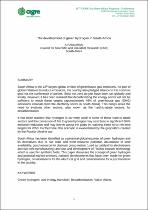JavaScript is disabled for your browser. Some features of this site may not work without it.
- ResearchSpace
- →
- Research Publications/Outputs
- →
- Conference Publications
- →
- View Item
| dc.contributor.author |
Pandarum, Aradhna

|
|
| dc.date.accessioned | 2024-01-11T12:11:18Z | |
| dc.date.available | 2024-01-11T12:11:18Z | |
| dc.date.issued | 2023-10 | |
| dc.identifier.citation | Pandarum, A. 2023. The development of green hydrogen in South Africa. http://hdl.handle.net/10204/13515 . | en_ZA |
| dc.identifier.uri | http://hdl.handle.net/10204/13515 | |
| dc.description.abstract | South Africa is the 12th largest global emitter of greenhouse gas emissions. As part of global initiatives to reduce emissions, the country also pledged alliance to this common goal via the conference of parties. Strict net-zero targets have been set globally and locally, however; it has been realized that decarbonizing the energy sector will not be sufficient to reach these targets (approximately 46% of greenhouse gas (GHG) emissions emanate from the electricity sector in South Africa). This brings about the need to evaluate other sectors, also known as the hard-to-abate sectors, for decarbonization. It has been realized that hydrogen is currently used in some of these hard-to-abate sectors and the conversion of this to green hydrogen may contribute in significant GHG emission reduction and may further assist the globe in realizing these strict net-zero targets for 2050. Furthermore, this scenario is exacerbated by the geopolitics created by the Russia-Ukraine war. South Africa has been identified as a potential global exporter of green hydrogen and its derivatives due to our solar and wind resource potential, abundance of land availability, good resource for platinum group metals (used as catalyst for electrolysers and fuel cell manufacturing) and use and development of Fischer tropsch technology which is used for synthetic fuels. This paper discusses the concept of green hydrogen and potential market avenues, national developments that have been made for green hydrogen, considerations for the electrical grid and considerations for a just transition in the country. | en_US |
| dc.format | Fulltext | en_US |
| dc.language.iso | en | en_US |
| dc.relation.uri | https://www.cigresa-events.co.za/cigre_2023_regional_conference/pdfs/Full-Programme-Draft.pdf?load=2197 | en_US |
| dc.source | 11th CIGRE Southern Africa Regional Conference, Pretoria, South Africa, 24-27 October 2023 | en_US |
| dc.subject | Decarbonisation | en_US |
| dc.subject | Green hydrogen | en_US |
| dc.subject | Just energy transition | en_US |
| dc.subject | Value chains | en_US |
| dc.title | The development of green hydrogen in South Africa | en_US |
| dc.type | Conference Presentation | en_US |
| dc.description.pages | 11 | en_US |
| dc.description.note | Paper presented at the 11th CIGRE Southern Africa Regional Conference, Pretoria, South Africa, 24-27 October 2023 | en_US |
| dc.description.cluster | Smart Places | en_US |
| dc.description.impactarea | Energy Industry | en_US |
| dc.identifier.apacitation | Pandarum, A. (2023). The development of green hydrogen in South Africa. http://hdl.handle.net/10204/13515 | en_ZA |
| dc.identifier.chicagocitation | Pandarum, Aradhna. "The development of green hydrogen in South Africa." <i>11th CIGRE Southern Africa Regional Conference, Pretoria, South Africa, 24-27 October 2023</i> (2023): http://hdl.handle.net/10204/13515 | en_ZA |
| dc.identifier.vancouvercitation | Pandarum A, The development of green hydrogen in South Africa; 2023. http://hdl.handle.net/10204/13515 . | en_ZA |
| dc.identifier.ris | TY - Conference Presentation AU - Pandarum, Aradhna AB - South Africa is the 12th largest global emitter of greenhouse gas emissions. As part of global initiatives to reduce emissions, the country also pledged alliance to this common goal via the conference of parties. Strict net-zero targets have been set globally and locally, however; it has been realized that decarbonizing the energy sector will not be sufficient to reach these targets (approximately 46% of greenhouse gas (GHG) emissions emanate from the electricity sector in South Africa). This brings about the need to evaluate other sectors, also known as the hard-to-abate sectors, for decarbonization. It has been realized that hydrogen is currently used in some of these hard-to-abate sectors and the conversion of this to green hydrogen may contribute in significant GHG emission reduction and may further assist the globe in realizing these strict net-zero targets for 2050. Furthermore, this scenario is exacerbated by the geopolitics created by the Russia-Ukraine war. South Africa has been identified as a potential global exporter of green hydrogen and its derivatives due to our solar and wind resource potential, abundance of land availability, good resource for platinum group metals (used as catalyst for electrolysers and fuel cell manufacturing) and use and development of Fischer tropsch technology which is used for synthetic fuels. This paper discusses the concept of green hydrogen and potential market avenues, national developments that have been made for green hydrogen, considerations for the electrical grid and considerations for a just transition in the country. DA - 2023-10 DB - ResearchSpace DP - CSIR J1 - 11th CIGRE Southern Africa Regional Conference, Pretoria, South Africa, 24-27 October 2023 KW - Decarbonisation KW - Green hydrogen KW - Just energy transition KW - Value chains LK - https://researchspace.csir.co.za PY - 2023 T1 - The development of green hydrogen in South Africa TI - The development of green hydrogen in South Africa UR - http://hdl.handle.net/10204/13515 ER - | en_ZA |
| dc.identifier.worklist | 27297 | en_US |






